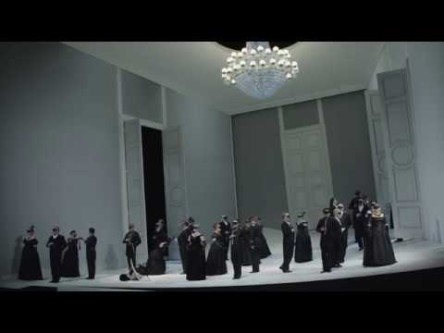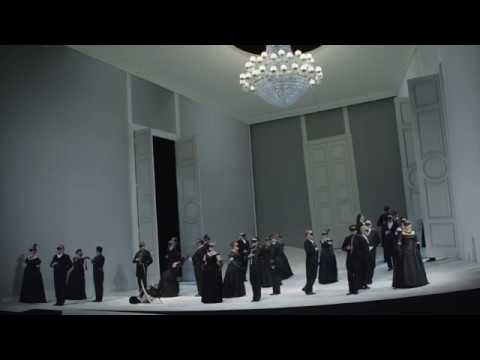 Finland Tchaikovsky, Eugene Onegin (Jevgenij Onegin): Soloists, Finnish National Opera Chorus and Orchestra / Mikhail Agrest (conductor). Finnish National Opera, Helsinki, 17.3.2017. (GF)
Finland Tchaikovsky, Eugene Onegin (Jevgenij Onegin): Soloists, Finnish National Opera Chorus and Orchestra / Mikhail Agrest (conductor). Finnish National Opera, Helsinki, 17.3.2017. (GF)

Production:
Director, sets, lighting design – Marco Arturo Marelli
Costumes – Dagmar Niefind
Cast:
Jevgenij Onegin – Josef Wagner
Tatiana – Olesya Golovneva
Lenskij – Jussi Myllys
Olga – Niina Keitel
Larina – Anu Ontronen
Filipjevna – Merle Silmato
Prince Gremin – Jyrki Korhonen
Triquet – Aki Alamikkotervo
Captain – Nicholas Söderlund
Zaretskij – Nicholas Söderlund
Guillot – Kyösti Latva-Kala
Soloist in the chorus – Halim Shon
Time flies. I thought it had been only several years ago that Helsinki last put on Eugene Onegin, but when I checked it turned out that it had opened at the end of November 2006, and the performance I saw took place just a few weeks later. I still have vivid memories of that production, staged in seven paintings – very beautiful – with the characters going in and out of the pictures. The new production is much more stylised, featuring a permanent big hall with doors on both sides and at the back opening towards an outdoor scenery with a garden sofa. There is a bare minimum of props.
The performance begins at the end: During the orchestral introduction Onegin returns to St. Petersburg after many years abroad and goes to a party where he meets Tatiana. Seeing her after all those years a sudden passion grips him and he begins to summarize his life in a series of flashbacks. For long stretches of the performance Onegin is present as an eyewitness to the proceedings.
This closeness contrasts strongly with a certain feeling of distance in the production as a whole. The arrival of the peasants in the first scene goes almost unnoticed. We only hear them in the distance. Likewise, the festivities in the final scene are subdued. The famous polonaise is played mainly to an empty stage. Here the production feels pale. On the other hand, the full company is present during Tatiana’s dramatic name-day party. At the duel that follows in the next scene, Onegin, instead of firing his weapon, embraces his rival – they are after all old friends – but the pistol goes off and kills Lenskij – an unusual reading but plausible.
Onegin is crushed with despair and tries to kill himself, but his weapon misfires every time. This particular scene may be too exaggerated and this also goes for his intensely emotional acting during his futile attempts to make Tatiana leave her husband in the last scene. Probably the director wants to show that even as cool and callous a person as the Onegin stands of the previous scenes cannot control his feelings in extreme situations. Josef Wagner manages to express both sides of his character and creates a many-facetted role portrait. Vocally he is excellent. Olesya Golovneva’s slim figure and lyrical voice make her a believable teen-aged Tatiana in the beginning of the opera but she also has the stature and coolness for the married woman in the last scene. Her letter-scene is moving. Her sister Olga has fairly little to sing but Niina Keitel has the stage-presence and radiation to make a vivid and charming portrait of her.
Jussi Myllys’s Lenskij is weak and diffident, as he should be, and he sings well in the farewell aria. Jyrki Korhonen stepped in at short notice as Prince Gremin – he is scheduled to sing the role at later performances – and gave a restrained and beautiful reading of the aria, just as he did ten years ago. As Monsieur Triquet, the versatile Aki Alamikkotervo performed the Frenchman’s couplet with elegance.
Conductor Mikhail Agrest was born in St. Petersburg and has been working at the Mariinsky Theatre there since 2001, which certainly makes him a suitable conductor for this particular opera. He drew some glowing playing from the responsive National Opera Orchestra.
Eugene Onegin is not the most overtly dramatic of operas, but this new production – I saw the second performance – offers some utterly intense emotions, performed from the heart.
Göran Forsling
